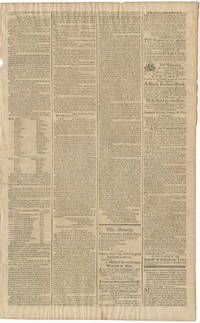
September 1789 Printing of the Act Establishing the Treasury Department, Along with Important Congressional Debates on Organizing the Federal Judiciary
by TREASURY DEPARTMENT; JUDICIARY; [ALEXANDER HAMILTON]
- Used
- Condition
- Very Good+
- Seller
-
White Plains, New York, United States
Payment Methods Accepted
About This Item
This issue of the Pennsylvania Packet includes key debates in the House of Representatives on the bill establishing the federal judiciary, as well as the text of the act establishing the Treasury Department and dramatic news of the French Revolution.
TREASURY DEPARTMENT; JUDICIARY. The Pennsylvania Packet, and Daily Advertiser, September 21, 1789 (No. 3320). Philadelphia: John Dunlap and David C. Claypoole. 4 pp., approx. 11½ x 18½ in.Excerpts
[Debate on Judiciary Bill]
[August 29, 1789:]
"Mr. [Egbert] Benson [of New York] observed, that if the clause is struck out of the bill, it will involve an abandonment of judicial proceedings on the part of the United States altogether, except in cases of appeals.... The difficulties which may arise in this case, are not justly chargeable to the bill itself, they are owing entirely to the constitution—for that is express, that the general government shall exercise all judicial powers: This legislature therefore, have it not at their option to establish judicial courts, or not: The words of the system are plain and full; and the institution of the courts, arise out of the very nature of the government: How far the operation of this power may extend, it is not for us to determine: Whether it will interfere with the state judicatories is a matter that must be the result of experiment." (p3/c4-p4/c1)
"Mr. [Theodore] Sedgwick [of Massachusetts] observed,... It is necessary to the completion of any system of government, that it should possess every power necessary to carry its laws and ordinances into execution." (p4/c1)
"Mr. [Fisher] Ames [of Massachusetts].... A government which may make, but not enforce laws, cannot last long, nor do much good." (p4/c1)
"Mr. [James] Madison [of Virginia]. It will not be doubted that some judiciary system is necessary to accomplish the objects of the government; and that it ought to be commensurate with the other branches of the government.... To make the state courts federal courts is liable to insuperable objections.... But laying these difficulties aside, a review of the constitution of the courts in many states will satisfy us that they cannot be trusted with the execution of the federal laws.... they are so dependent on the state legislatures, that to make the federal laws dependent on them, would throw us back into all the embarrassments which characterized our former situation." (p4/c2-3)
"On the whole, Sir, I do not see how it can be made compatible with the constitution, or safe to the federal interests to make a transfer of the federal jurisdiction to the state courts, as contended for by the gentlemen who oppose the clause in question." (p4/c3)
[September 17, 1789:]
"The judicial bill, with the amendments made by the house, was read the third time.
"Mr. Gerry, Mr. Burke Mr. Jackson, and Mr. Stone objected, and argued at some length against the passing of the bill. They apprehended that it was a system calculated for oppression, and that it would have a mischievous operation.
"Mr. Madison in a few words defended the bill, and said that though it was not in all its parts agreeable to his mind, it was as perfect as could be formed at this time, or until experience had discovered its positive defects. Had it been enacted in the form in which it came from the senate, he said, he should have been bound to vote against it. But the amendments made by the house had, he believed, removed the principal objections to it." (p3/c1)
The bill passed by a vote of 37 to 16.
["An Act to Establish the Treasury Department," September 2, 1789, signed in type by Speaker Frederick A. Muhlenberg, Vice President John Adams, and President George Washington.]
"there shall be a department of Treasury, in which shall be the following officers, namely: a Secretary of the Treasury, to be deemed head of the department, a Comptroller, an Auditor, a Treasurer, a Register, and an Assistant to the Secretary of the Treasury, which Assistant shall be appointed by the said Secretary." (p3/c2)
"it shall be the duty of the Secretary of the Treasury to digest and prepare plans for the improvement and management of the revenue, and for the support of public credit; to prepare and report estimates of the public revenue, and the public expenditures; to superintend the collection of the revenue; to decide on the forms of keeping and stating accounts and making returns, and to grant under the limitations herein established, or to be hereafter provided, all warrants for monies to be issued from the Treasury, in pursuance of appropriations by law...." (p3/c2)
[Reports from London of the beginnings of the French Revolution:]
"In every province of this great kingdom the flame of liberty hath burst forth; and when a whole nation, with an enlightened mind, assert their claim to the privileges of men, experience has told us, that it is not in the power of monarchs to withhold their rights. But before they have accomplished their end, France will be deluged with blood." (p2/c2)
"The Bastile is burnt, and all the prisoners set at liberty...." (p2/c4)
Historical Background
The opening of the First Congress on March 4, 1789, signaled a new system of federal government. Among the first tasks of the first United States Congress under the new U.S. Constitution was to organize the federal judiciary and the departments of the Executive branch, including the Treasury Department.
On June 12, 1789, Senator Richard Henry Lee of Virginia reported the judiciary bill out of committee; Oliver Ellsworth of Connecticut had been its primary author. The Senate passed the bill by a vote of 14-6 on July 17, and the House debated it in July and August. The House passed the bill with amendments on September 17. The Senate approved some of the amendments and rejected others on September 19. The House accepted the Senate's version on September 21, and President George Washington signed it into law on September 24.
Representative Abraham Baldwin of Georgia reported a bill establishing the Treasury Department from the committee to organize the executive departments on June 4, 1789, and the House passed the bill on July 2. The Senate passed the bill on July 31 with several amendments, and the House agreed to all of the Senate's amendments on August 3-5, except for part of one. The Senate insisted on that amendment, and both houses appointed a committee of three to meet as a conference committee. That committee could not reach an agreement, and the Senate receded from its insistence on that amendment on August 25. President George Washington signed it into law on September 2. This issue of the Pennsylvania Packet prints the act (p3/c2-3).
On September 11, President Washington nominated Alexander Hamilton as Secretary of the Treasury and also made nominations for Comptroller, Treasurer, Auditor, and Register. The Senate approved the nomination of Hamilton the same day. It also approved Washington's nominations for Comptroller and Treasurer that day, and those for Auditor and Register the next day.
Additional Content
This issue also includes dramatic reports from London of the early days of the French Revolution, including the storming of the Bastille (p2/c2-4); a message from President Washington to Congress, transmitting a letter from Arthur St. Clair, Governor of the Western Territory, who writes of "reciprocal hostilities" between Native Americans and American settlers along the Ohio River and requests militia to enforce order (p3/c2); the satirical poem "The Parliament Man" (p2/c1); and many notices and advertisements, including one offering a £10 reward for the conviction of the "evil-minded person or persons" who had stolen the cups of several of the public lamps in Philadelphia (p3/c4), and two advertisements for the sale for ten years of "a likely negro boy, 19 years of age" (p1/c3) and the sale for twelve years of a "likely, healthy negro girl, 17 years of age"(p1/c4). Pennsylvania passed an Act for the Gradual Abolition of Slavery in 1780, abolishing slavery but not freeing enslaved Pennsylvanians, and allowing their children to be indentured until they reached age 28, as these advertisements make clear.
The Pennsylvania Packet, or the General Advertiser (1771-1800) was founded by John Dunlap (1747-1812) in late 1771 as a weekly newspaper in Philadelphia, though it relocated to Lancaster during the British occupation of Philadelphia in 1777-1778. In 1776, Dunlap became the official printer for the Continental Congress, and he printed the first copies of the Declaration of Independence. On May 30, 1783, Benjamin Towne turned the Pennsylvania Evening Post into the first daily newspaper in the United States. However, with Towne branded a traitor and forced to hawk his own papers on the street, the newspaper collapsed the following year. John Dunlap and David Claypoole (1757-1849) then made their Pennsylvania Packet the first successful daily newspaper beginning on September 21, 1784. It was the first newspaper to print the U.S. Constitution in 1787, and the first to publish George Washington's Farewell Address in 1796. It underwent numerous name changes in the 1790s until sold in 1800 and renamed Poulson's American Daily Advertiser.
Condition: About Fine
Reviews
(Log in or Create an Account first!)
Details
- Seller
- Seth Kaller, Inc.
(US)
- Seller's Inventory #
- 24832
- Title
- September 1789 Printing of the Act Establishing the Treasury Department, Along with Important Congressional Debates on Organizing the Federal Judiciary
- Author
- TREASURY DEPARTMENT; JUDICIARY; [ALEXANDER HAMILTON]
- Book Condition
- Used - Very Good+
- Quantity Available
- 1
- Publisher
- John Dunlap and David C. Claypoole
- Place of Publication
- Philadelphia
- Date Published
- 1789
- Weight
- 0.00 lbs
- Keywords
- treasury department, alexander hamilton, james madison, first federal congress, founding fathers, constitution, federal judiciary
- Bookseller catalogs
- Alexander Hamilton;
Terms of Sale
Seth Kaller, Inc.
30 day return guarantee, with full refund including shipping costs for up to 30 days after delivery if an item arrives misdescribed or damaged. Authenticity guaranteed for the life of the book or document.
About the Seller
Seth Kaller, Inc.
About Seth Kaller, Inc.
Glossary
Some terminology that may be used in this description includes:
- New
- A new book is a book previously not circulated to a buyer. Although a new book is typically free of any faults or defects, "new"...





